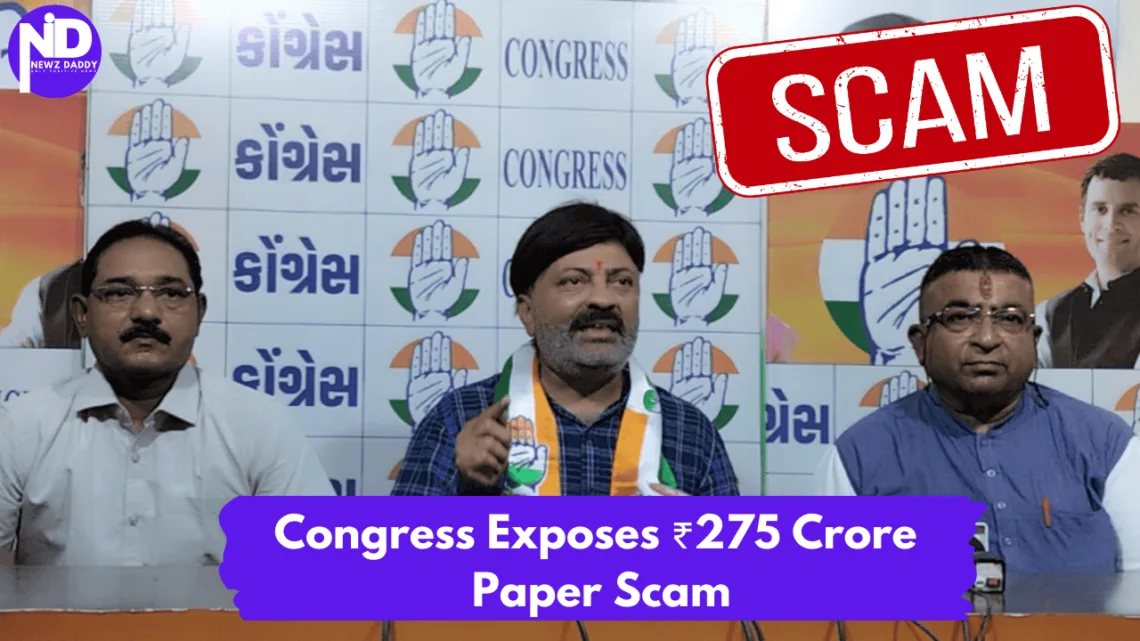“Congress Exposes ₹275 Crore Paper Scam
Newz Daddy Political Updates
Main Points Of Article
- Gujarat Congress spokesperson Hemang Rawal accuses the State Textbook Board of corruption.
- Despite reducing textbook pages/content (e.g., 10th-grade math: 318→230 pages), prices remain unchanged, raising profit-making suspicions.
- In 2023, a paper procurement scam was exposed: paper bought at ₹107/kg despite cheaper ₹87/kg options.
- In 2024, paper was purchased at half price (₹53.50/kg), saving ₹275 crore, but textbook prices were not reduced.
- Textbook Board holds ₹300+ crore reserve despite claiming “no profit, no loss.”
- Rawal demands a 50% price reduction for 2025 textbooks, citing taxpayer-funded production.
- Blames the government for ignoring teacher shortages, poor student results, and failing to improve education quality.
Gujarat Textbook Board Under Fire: Congress Demands 50% Price Cut Amid Corruption Allegations
Hemang Rawal, a prominent spokesperson for the Gujarat Pradesh Congress Committee (GPCC), has launched a scathing critique against the Gujarat State Textbook Board, accusing it of exploiting students and parents through inflated textbook prices and corrupt procurement practices. At a press conference held at Rajiv Gandhi Bhavan, Rawal highlighted glaring discrepancies in textbook pricing, reduced content, and a multi-crore paper procurement scam, demanding immediate government action.
In 2023, Gujarat witnessed a shocking decline in 10th and 12th-grade exam results, with thousands of students failing. Instead of addressing systemic issues like teacher shortages and outdated teaching methods, the Education Board controversially removed chapters from textbooks for classes 6–12, claiming it would “reduce student burden.” However, Rawal argues this move masked deeper corruption.
Last year, the Congress exposed a major scandal: the Textbook Board purchased paper at ₹107/kg through a tender, ignoring cheaper options at ₹87/kg. The issue even reached the High Court. Fast-forward to 2024, the Board bought 70gsm paper for ₹53.50/kg—half the 2023 price—saving ₹275 crore. Yet, textbook prices haven’t dropped. “If paper costs halved, why aren’t books 50% cheaper?” Rawal questioned.
Rawal compared old and new textbooks to highlight the Board’s profit-driven approach. For instance, the 10th-grade math book previously had 318 pages (830g) priced at ₹126. The 2024 edition has 230 pages (605g) but still costs ₹126. Similar trends apply to other subjects. “They’re cutting content, not costs. Parents are paying the same for less,” he said.
Despite claiming to operate on a “no profit, no loss” basis, the Board reportedly holds over ₹300 crore in reserves. Rawal criticized this as unethical, especially since textbooks are funded by taxpayer money via schemes like Sarva Shiksha Abhiyan and allocations from state and central governments.
Congress has demanded an immediate 50% reduction in textbook prices for 2025, arguing that lower paper costs must benefit families. “Education is a right, not a business. The government must prioritize students over profits,” Rawal asserted.
Parents and educators have echoed Rawal’s concerns. Ramesh Patel, a school trustee from Vadodara, said, “Every year, we pay more for thinner books. This is daylight robbery.” Meanwhile, the state government has yet to respond to the allegations.
Rawal urged Chief Minister Bhupendra Patel to intervene, stressing that affordable education is crucial for Gujarat’s future. “Reducing textbook prices is a small step toward restoring trust in our education system,” he concluded.




